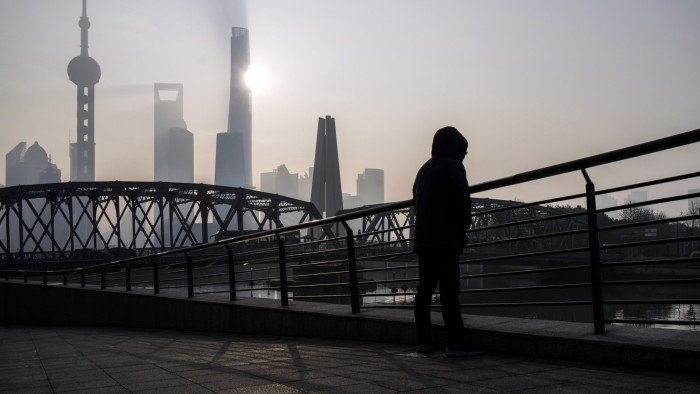China’s central government is trying to stem a spate of detentions of business executives by local authorities that are stoking fears among entrepreneurs and risk undermining efforts to boost economic growth.
A review of filings by the Financial Times found that senior figures from more than 80 companies listed on the Shanghai and Shenzhen stock exchanges were arrested in 2024.
ChinaThe securities regulator is requiring companies to disclose the imprisonment of majority shareholders, CEOs, CEOs and other top executives, and the numbers suggest far broader action against executives across the country.
Some of the arrests appeared to have little or no legal basis, and in many cases they were carried out by authorities located far from the victim’s business operations, a practice that Chinese media describes as “long-distance fishing.” A leaked official document from the southern province of Guangdong said thousands of businesses in a single city had been targeted by authorities from other areas since 2023.
Premier Li Qiang this month called for greater oversight of corporate law enforcement, saying the government would review regions with unusual income growth due to fines and seizures or high levels of enforcement outside its jurisdiction.
“There are persistent cases of abuse of administrative discretion and unfair enforcement in certain areas and sectors,” Li said, according to the official Xinhua news agency. The Prime Minister added that it was important to “address the pressing issues raised by citizens and businesses.”

Analysts said the high number of detentions could be linked to the deteriorating financial situation of local governments, which have suffered from falling revenue from land sales nationwide real estate crisis This has also slowed China’s economic growth.
“My friends are being pressured from all sides,” said a top Chinese investor, who claimed some local governments were checking residents’ assets to fine the richest.
The investor, who declined to be named and was himself forced to pay off a local authority to secure his release from prison about a decade ago, said some areas had turned to “long-distance fishing”.
“I accuse you of violations in my region and I will take you away and make you pay for it,” he said, describing the attitude of the local authorities. “It’s like a nationwide shakedown.”
About half of the 82 listed business-related arrests reviewed by the FT in 2024 involved authorities from another region or an unspecified location.
Eugene Weng, a lawyer at Shanghai-based Wintell & Co, said some of his clients had experienced abusive prosecutions by authorities from other regions, adding that this was also the case dwindling trust in the business environment.
“The feeling of fear is beyond imagination,” Weng said. “Entrepreneurs think only in the short term and take profits as quickly as possible, instead of investing in their companies and transferring funds abroad as quickly as possible.
“This actually worsens tax revenues and employment,” he added, “causing local finances to enter a vicious cycle.”
The internal report, prepared for Guangdong provincial officials in April and later leaked online, said cross-jurisdictional enforcement had drawn a growing number of local businesses into the thrall.
The report said that since 2023, nearly “10,000 companies in the city of Guangzhou have faced prosecutions from other sectors, with the vast majority of cases involving private companies and with a fairly clear profit motive.”
A Beijing-based entrepreneur said the detentions had created a climate of fear among the founders. “It gets scary when you start getting to know people who have been incarcerated,” he said. “The government has to do something.”
China’s opaque enforcement system reinforces these concerns. Companies said they and the families of the detained executives received little information about their cases.
The board of “smart city” solutions provider Zhejiang Whyis Technology struggled in March to respond to a demand from securities regulators for more information about the detention of Chief Executive Ye Jianbiao.
In a filing, the agency said that other than a notice from another city’s anti-corruption bureau that Ye was “under investigation for work-related offenses,” neither it nor Ye’s family had “received any other formal communications or documents,” nor did Ye ” “Be informed about the progress or conclusions of the investigation”.
Nine months later, the 51-year-old manager remains in custody. They could not be reached for comment. A company representative said they had no further information about Yes Fall and would make an announcement once he was released.
Some provinces have begun publicly announcing efforts to protect private businesses. Prosecutors in eastern Zhejiang revealed last month that local police had helped prevent the kidnapping of an entrepreneur named Shen by officers from another area.
After Shen was abducted from his home, he fled from police as he was being taken out of the province. Zhejiang police then arrested the two foreign officials, who initially claimed they were acting on orders from their superiors, and were eventually detained.
In some cases, the detained executives ended up in the hands of authorities in areas where they apparently had no business.
Zhang Jian, 55, has spent more than two decades developing Aima Technology Group into one of China’s largest electric scooter manufacturers. His family’s 73 percent stake in the group is worth about RMB 19.5 billion (US$2.67 billion), ranking it 247th China’s “rich list” compiled by the Hurun research group.
But in October, Aima announced that Zhang had been arrested by an anti-corruption unit from Chengde, a city hundreds of kilometers from his home and company headquarters in Tianjin. According to public records, Aima does not hold any assets in Chengde.
“They say it’s about his personal problems, but they don’t want to tell us more,” said an Aima manager who did not want to be named.
The manager said Aima was able to send Zhang important company documents to sign from detention and they hoped he would be released soon.
“Many of the imprisoned chairmen will be released in two or three months,” said the manager. “I can’t say how long we’ll stay there, but that’s the situation in the market.”
Data visualization by Haohsiang Ko






